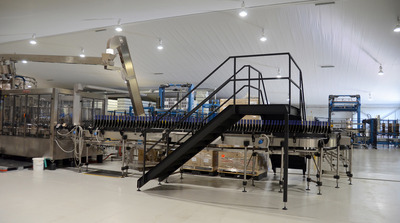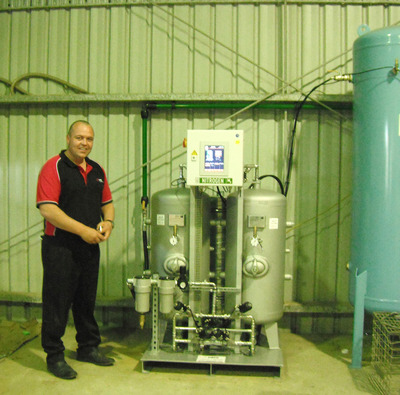Spreading Wild Oats with on-site nitrogen generation
Friday, 01 November, 2013
Despite modern advances, winemaking is still, at its core, a simple art: grape juice is fermented with the help of some yeast. However, supplying wine in the quantities and qualities demanded by the modern consumer has moulded the culture of winemaking across the globe.
To meet increased demand, winemakers must maximise output while still producing wines that are vintage quality and true to traditional methods. Stainless steel processing vats are increasingly replacing oak barrels and precision-controlled crushing technologies are taking the place of human feet. Winemakers are taking their craft into the era of automation.
One wine producer who has successfully blended traditional winemaking values with the precise management of processing technologies is Robert Oatley Vineyards. Bob Oatley is a fifth-generation Australian who established Rosemount Estate in the 1960s, producing his first commercial vintages in the early 1970s.
After a brief hiatus from winemaking, Oatley bought a Mudgee property in 2006, establishing Robert Oatley Vineyards. The region’s largest winery, the property serves as the family’s winemaking headquarters. The family’s award-winning Wild Oats brand has been a great success, becoming one of the country’s top-selling wines within two years of being released.

With a production capability of thousands of bottles per day, the Robert Oatley Wines bottling facility uses compressed nitrogen at almost every step of the bottling process.
The facility’s compressors are supplied by Compressed Air and Power Solutions (CAPS) Australia. On a support visit to the winery, Matthew Broadbent, senior sales engineer for NSW, noticed that the winery was using bottled nitrogen for some processes.
“I quickly realised that the winery was spending more than necessary on its nitrogen requirements,” Broadbent said. “So I put together a proposal that I was sure could save them money.”

Broadbent proposed an installation of the Inmatec IMT-PN 1650, which provides an output of 37 m3 per hour. The winery’s bottled nitrogen restricted it to 150 m3 per day.
The resulting cost savings of the full nitrogen package exceeded the company’s expectations. “The new equipment at Robert Oatley Vineyards has cut the price per cubic metre of nitrogen per day by more than 75%,” said Broadbent.
Nitrogen can now be used throughout the winery, not just on the bottling line. Nitrogen is used on the bottling line to purge the lines after sterile water has been pumped through them. In order to minimise oxidation, nitrogen is also used while transferring the wine to bottles.

“To achieve this, the filler bowl has a head of nitrogen and gas is forced into the liquid and the sealing capsule,” said Philip Griffin, production manager at the winery.
A vineyard’s success is dependent on the health of the earth, so it stands to reason that the company believes in protecting and nurturing the environment. The compressors and nitrogen generators use environmentally friendly compressor lubricant and noise pollution is kept to a minimum.
“The compressors are installed in areas where a number of our staff are permanently located,” said Griffin. “The compressors supplied by CAPS are relatively quiet, which protects our workers and maintains a tranquil atmosphere.”
CAPS continues its relationship with the winemaker, with a regular service schedule carried out by the compressor company’s qualified technicians to ensure the smooth operation of all the compressed gas systems.
According to Griffin, the upgraded compressed air system and nitrogen generators allow the winery to get on with its primary job: to continue producing Robert Oatley’s wines.
Lighting up wine spoilage in real time with novel biosensor
A biosensor that glows when acetic acid is detected has been built by researchers to help...
Novel food processing technologies retain more nutrients in food
The potential of a range of modern techniques to improve the nutritional profiles of grain-,...
Shaking up machine changeover times on cartoning line
A food manufacturer of shakes and protein bars reduced the time taken for machine changeovers on...










